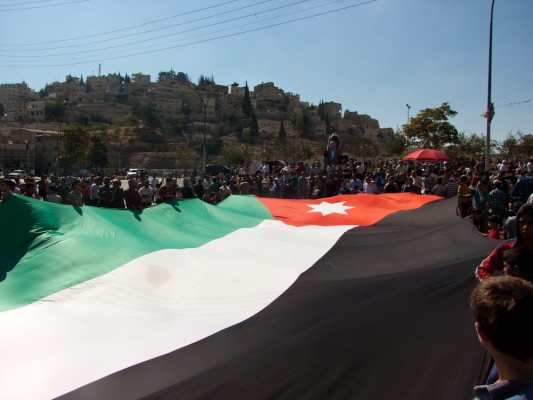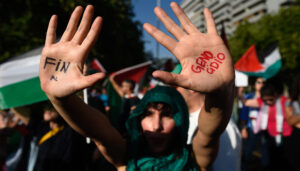A quick look at the Arab world today enables us to reach a simple conclusion; that almost every Arab country is shaping a political discourse underpinned by what observers call “identity politics”.
By May S
In Lebanon, it is largely the religious sect you belong to that identifies your political preferences. In neighboring Syria, observers are warning against a civil war between the different religions and different sects within these religions if the regime collapses, which indicates how sectarianism is shaping the political discourse as well.
Jordan is not an exception. While the entire Levant region was considered a unified land prior to Sykes-Picot agreement, the “divide-and-rule” doctrine took its toll on the political discourse in the region in the second half of the nineteenth century onwards, largely based on ethnical divisions.
However, chauvinistic voices that seek to further disenfranchise citizens and deprive them of their constitutional rights, irrespective of their identity, are relying on numerous myths that are cited to endorse their argument against fellow citizens. Very often, these voices are loud and present in the public sphere, while very few voices attempt to correct the inaccurate comparisons and distorted historical facts.
The following are some examples of the common stereotypes and myths that need to be shattered if Jordan ever wishes to break out of the “identity politics” that cannot safeguard its stability forever.
How Jordanians of Palestinian origins acquired citizenship
A common stereotype, held by chauvinistic people and others who lack the necessary knowledge on the topic, tends to believe that “Jordanians sympathized with Palestinians and granted them citizenship as a favor, because they were homeless”.
This view ignores the fact that Jordanian citizenship was granted to every Arab who was living in the areas of Palestine, which were under the rule of the Jordanian Arab Army in 1949, with the exception of Jews. In 1950, those areas, which came to be known as the West Bank, and the East Bank of the River Jordan formed one country and fell under the rule of one regime and one parliament.
The decision of unity came as a result of the vision of King Abdullah I, the founder of the Kingdom, to achieve Arab unity under the Hashemite rule and the unity with the West Bank was seen as a starting point. A prominent Jordanian lawyer, who studied the issue thoroughly, affirmed that not even a single Palestinian individual applied for the Jordanian citizenship. It was granted to these people by default, as Jordan believed in the unity at the time and amended the Nationality Law at a later stage to adjust to the changes. According to this narrative, which is documented and known for lawyers and rational politicians, Jordanians of Palestinian descent are citizens with full rights and duties and not “transit passengers” who were granted citizenship as a “gift”.
Based on these facts, dismissing the advocacy for equal political rights for everyone and saying that “if Jordanians of Palestinian origins interfere in political affairs, then Egyptian laborers or foreign investors may also want to interfere” are complete nonsense, as the first group represents citizens, while the others are “expats”.
From this perspective, we cannot accept a comparison between the refugees in Syria and Lebanon and others in Jordan. While this comparison may hold some water, if we talk about refugees who do not hold citizenship status, it is completely inapplicable to Jordanian citizens of Palestinian descent.
A religious leader, based in Jerusalem, has recently addressed Jordanians of Palestinian descent in Jordan and asked them “not to interfere in Jordanian affairs and reform process”. He has reminded them that they live in better conditions, when compared to refugees in Syria and Lebanon. The religious leader seems to fall in the same trap and ignore the fact that they live in better conditions because they shall be treated as “citizens”, whereas they have not been granted this status in the other countries. Asking them to keep away from politics is negating their constitutional rights.
Black September perceived as a ‘civil war’
The fact that these events, which came to be known as ‘Black September’, have never been documented in an impartial unbiased manner has contributed to the crisis. In fact, students never get to know what happened in 1970 and are exposed to biased interpretations that further awaken grudges and hatred. The so-called ‘civil war’ does not appear in our curriculums and our media in an unbiased manner and we only get to hear about it in the statements and discourses of chauvinistic people who refer to it as a ‘civil war’, when facts indicate it was not perceived as such.
The Jordanian army, back in 1970, was comprised of ‘East bankers’ and those who were of ‘Palestinian descent’ and the Fedayieeh were also composed of members of different creeds. This means that it could not have been a civil war but rather a confrontation between two ideologies and people who wanted the monarchy and others who preferred another form of regime.
Today, many chauvinistic views depict “Palestinians” as “traitors”, because of their “attempt to overthrow the regime in 1970”. However, this view is largely mistaken, because the confrontation was not between “Jordanians and Palestinians” as I have explained above and it also takes matters out of their context by simplifying the issue and neglecting the political ideologies that prevailed at the time.
Based on this distorted narrative, many of these people oppose re-integrating Jordanians of Palestinian origins in the security forces and the army, claiming that they cannot “trust these people”. This belief stands in the way of achieving full equality among the citizenry in Jordan.
Allocating each ethnicity a sector creates the ‘balance’
Generally speaking, Jordanians of Palestinian origins are allowed to start businesses freely and dominate the private sector, while East bankers dominate the public sector, the army and the security forces. This so-called ‘balance’ has been perceived by many as a recipe of stability in the country, while in actuality, it only deepens the rift and the identity crisis.
Citizens who pay taxes and perform all of their duties as citizens expect to have a fair representation that does not treat them as an “ethnic bloc” but as equal citizens. The private sector does not create the “allegiance” that these same forces believe “Palestinians” lack and the political logic stipulates that a taxpayer gets to know where his/her tax is spent and is entitled to have a say in his/her country’s affairs. Thus, the distinction between economic and political rights does not make sense to a ‘citizen’ who pays taxes and abides by the country’s rules and regulations.
The dual allegiance is an obstacle
If you ask Jordanians of Palestinian origins about their home countries, they are likely to mention both “Jordan and Palestine” or in some cases only one of these countries. This is attributed to the several historical factors that have shaped the identity of the two states and the historical relations and geographic proximity.
However, chauvinistic forces do not accept this “dual allegiance” and force people to choose between two equally important components of their identity in order to practice political rights. I still find it surprising to some extent that Circassians, for example, are not forced to make this “tough decision” and they freely declare allegiance to Jordan and their Circassian roots and identity.
Tribalism and allegiance to the country are used interchangeably
Being a member of a tribe is one thing and having a blind allegiance that supersedes allegiance to the country at large, commonly referred to as ‘tribalism’, is a totally different one. The problem is exacerbated when ‘tribalism’ and allegiance to the country are used interchangeably and when the two concepts are believed to be interconnected, while they are actually contradictory.
If you are blinded by ‘tribalism’, it means you are not loyal enough to the country because you are harming the national interests. Thus, it becomes nonsense if you claim that you are ‘too loyal’ and cite the fact that ‘you belong to tribe X’ and cherish ‘the tribal values and the tribalism’ that characterize the Jordanian society.
A former Jordanian official employed his relatives in the municipality that he headed and had them registered for salaries that were paid from the public money. His relatives did not actually work at the municipality and they only showed up at the end of the month to receive their salaries. This Jordanian official, who resembles many other officials, probably thinks he is serving his tribe and would defend his loyalty to Jordan by proudly declaring he belongs to this tribe, but in fact, he is harming the very same country he claims he is loyal to when he abuses his power and the public money at his disposal.
Selective response and selective identification of threats
Examples are abundant on incidents whereby the same threat generated different reactions. When the Islamic Action Front (IAF), the political arm of the Muslim Brotherhood in Jordan, was attacked by opponents and its headquarters were attacked a few weeks ago, it was reportedly threatening to form ‘militias’ to protect members, as the state allegedly does not do enough to protect them.
The statement is undoubtedly condemned, regardless of the source. However, another group of so-called ‘loyalists’, who were apparently fed up with demonstrations and protests calling for reform, staged a sit-in and declared that they were ‘ready to form tribal militias’ and ‘help the state revoke the citizenship of those protestors’. This insult was happening before the eyes of policemen who were there thanking the group for their ‘loyalty’.
I still cannot understand why the IAF’s militias were seen as a threat and infuriated the public opinion and the members of the Parliament, while the ‘tribal militias’ were apparently accepted by the police forces. I fail to understand how one group threatens the “public security”, while the other one “preserves it”. It also shows how easy it can be to tamper with “citizenship” and threaten to revoke it at any time, when this is clearly unconstitutional.
These are just a few examples of common myths and stereotypes that continue to plague the national debate. As long as we do not address them in our curriculums and media, a true reform will remain a fantasy!
—
An edited version of this article appeared in Babelmed.







